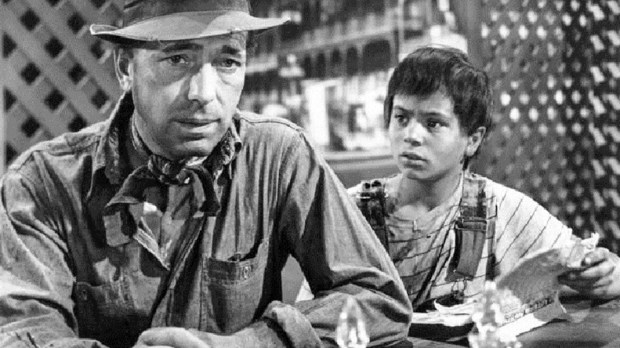Lenten Campaign 2025
This content is free of charge, as are all our articles.
Support us with a donation that is tax-deductible and enable us to continue to reach millions of readers.
Humphrey Bogart has made more classic movies than anyone. Take a look at the American Film Institute’s list of its top 100 movies of all time, and you’ll find that four feature Bogart — three in the top 50. He displays his range in those films, too, playing remarkably different characters in each: A scarred antihero in Casablanca. A drunken riverboat captain in The African Queen. A hardboiled detective in The Maltese Falcon.
But truthfully, I think Bogart’s at his best when he plays a deplorable heel in John Huston’s all-time classic, The Treasure of the Sierra Madre.
Treasure was released 70 years ago this month, beginning its run in Los Angeles January 15, 1948 before rolling wide to the rest of the country January 24. Based on a 1927 novel by B. Traven, the film focused on a trio of 1925 gold miners who hope to strike it rich in Mexico’s forbidding mountains.
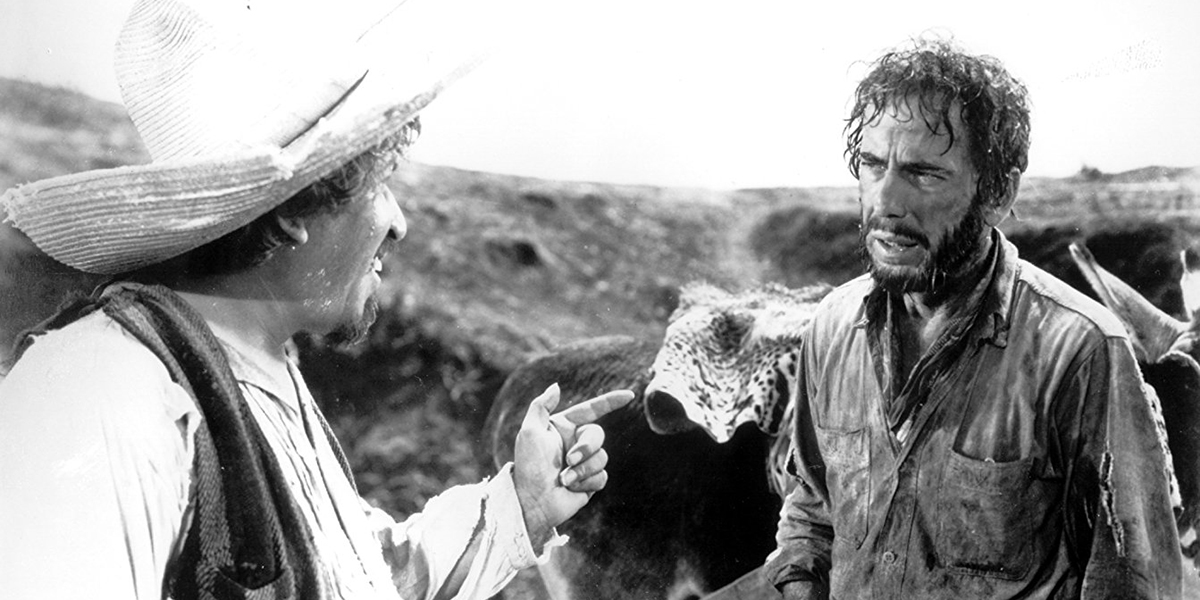
But the movie, like the mining operation itself, was a gamble: Most of it was filmed on location, one of the first to ever be done so, and Warner Bros. eventually spent $3 million making Treasure — a treasure itself at the time. Studio head Jack Warner grew so frustrated with the movie’s escalating costs that he reportedly threw up his hands and said, “Yeah, they’re looking for gold all right — mine!”
But all the money and effort that went into Treasure proved to be well worth it. Though it made just $2.3 million in its initial run, re-releases pushed it into the black. More importantly, the film was nominated for four Oscars, including Best Picture, and won three of them: Huston won a pair for Best Director and Best Writing Adapted Screenplay, and his father, Walter, took home an Oscar for Best Supporting Actor. (He played the wise, toothless prospector, Howard.)
Not bad for what amounts to a straight-up sermon on greed.
That’s right: Treasure is a flat-out, unapologetic morality fable. And its first lesson takes place before you’ve taken your first bite of popcorn.
The movie opens in the dusty town of Tampico, Mexico, where Bogart’s Fred Dobbs begs in the streets. He solicits from the same man in a white suit (John Huston) three times without, seemingly, noticing who he’s begging from. It’s a deft bit of foreshadowing: Already we see that Dobbs is preoccupied with money, ignoring the people — intentionally or no — who are giving it to him.
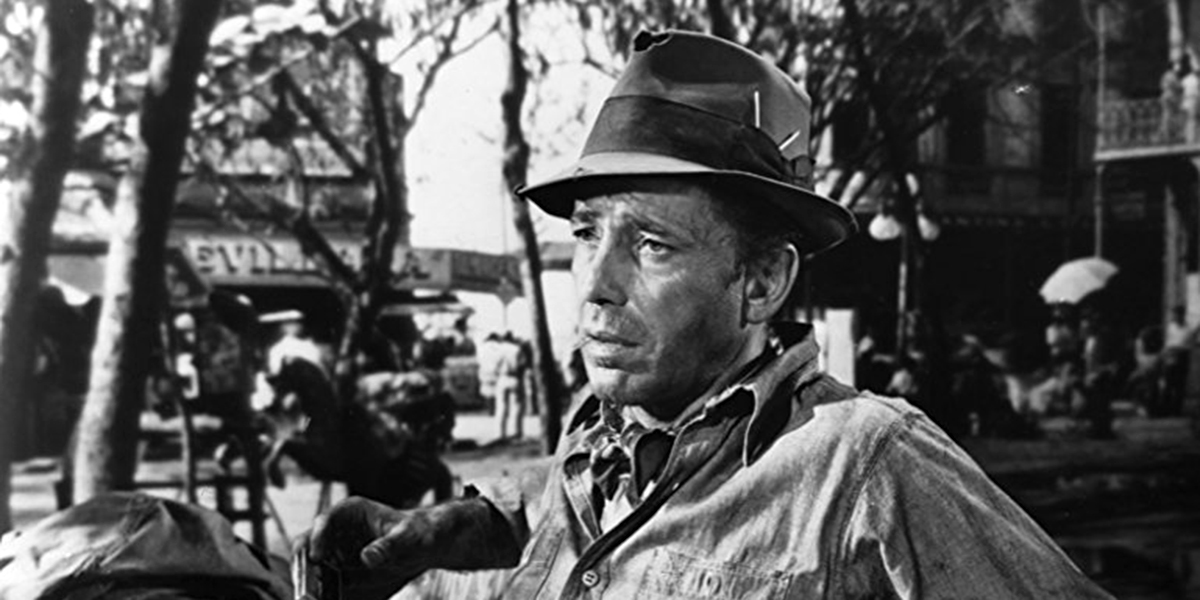
I think the scene has a biblical echo to it, too: How often do we embrace all the gifts we’ve been handed while completely ignoring the Giver? I do that all too frequently.
During that same sequence of scenes, Dobbs ignores another biblical directive — the Golden Rule. “Do unto others as you would have them do unto you,” the Bible tells us. But despite the monetary mercy shown by the man in the white suit, Dobbs has none to give to a poor street urchin selling lottery tickets. “Get away from me, you little beggar!” Dobbs shouts — ignoring the obvious irony that technically he’s the beggar: The kid’s a businessman, and a pretty good one at that. Finally, Dobbs buys a share of a lottery ticket — “a twentieth so I don’t have to look at your ugly face.”
Dobbs burns through his pesos quickly. He finds himself in a flophouse with a fellow hardbitten laborer named Curtain (played by Tim Holt), listening to an old prospector, Howard, spin tales of unimaginable riches and unmistakable loss. “I know what gold does to men’s souls,” he says. Then Howard adds: “That’s gold, that’s what it makes us. Never knew a prospector yet that died rich. Make one fortune, he’s sure to blow it in tryin’ to find another.”
Curtin’s unimpressed. “I wouldn’t mind a little of that kind of trouble,” he says. And the next day, Dobbs suggests that he’d be immune to the ill effects of gold fever.
“Gold don’t carry any curse with it,” he says. “It all depends on whether or not the guy who finds it is the right guy. The way I see it, gold can be as much of a blessing as a curse.”
Maybe that’s true. But when Dobbs’ one-twentieth share of a lottery ticket actually hits, he, Curtain and Howard have a chance to put Dobbs’ faith in himself to the test: It’s enough money to stake a claim on a promising gold mine.
Seventy-year-old spoiler alert: Dobbs fails his test. Gold, and the idea of getting more of it, corrupts this already corrupted soul, turning him from a selfish vagabond into an out-and-out monster. It impacts those around him, too. Greed is considered one of the seven deadly sins, and in this case, that proves to be true. Yes, they find a treasure, but in the end it proves to be just so much dust.
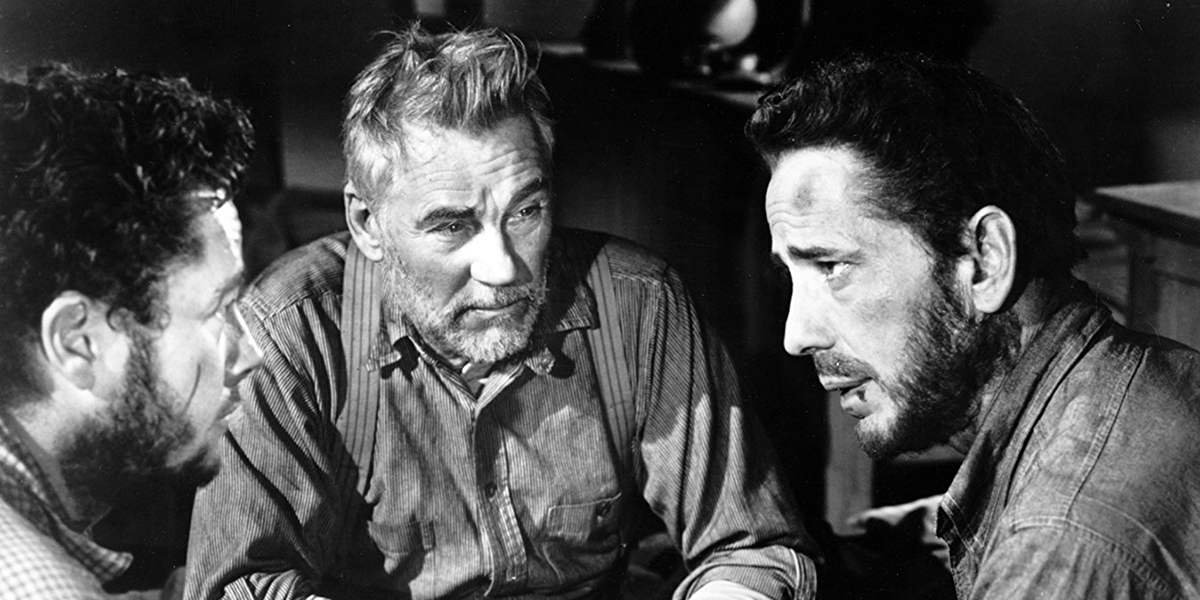
The movie itself rarely points to the Bible, but it’s not hard to draw some dotted lines from this classic movie to the Good Book. “Thou Shalt Not Covet,” we’re told in the Ten Commandments. “Thou shalt not steal. Thou shalt not kill.” In Treasure of the Sierra Madre, one sin begets another, then another.
“Do not lay up for yourselves treasures on earth, where moth and rust destroy and where thieves break in and steal… For where your treasure is, there your heart will be also.” Jesus tells us in Matthew 6:19 and 21.
“But if we have food and clothing, with these we will be content,” we read in 1 Timothy 6:8-10. “But those who desire to be rich fall into temptation, into a snare, into many senseless and harmful desires that plunge people into ruin and destruction. For the love of money is a root of all kinds of evils. It is through this craving that some have wandered away from the faith and pierced themselves with many pangs.”
I won’t spoil Treasure of the Sierra Madre any more than I already have, but trust me: It’s not only a great, all-time classic — a movie that I think everyone should see at least once — but one with lots of spiritual heft. If you haven’t seen it, you should. You can stream it on Amazon, YouTube, Vudu and Google Play for $2.99, or get it off iTunes for $3.99.
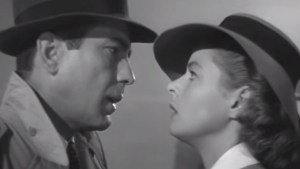
Read more:
‘Casablanca’: How a “mess” of a film became a classic
